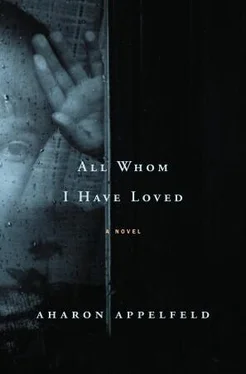“Your father is a charming man,” Halina said, as if to tease me.
“What is charming?” I pretended not to know.
“Don't you know?”
“No.”
“Your father is a very handsome man, and all the women want to kiss him,” she said, bursting into wild laughter and collapsing on the floor. Halina was lively and amusing but a chatterbox. After seven hours with her my head was full of noise, and I fled to the bedroom and curled up under the blanket so as to get away from it.
The days pass and Halina learns more and more German words. I'm embarrassed; my Ukrainian vocabulary is weak and jumbled, and I can hardly string a sentence together. When I finally come out with a Ukrainian sentence, Halina bursts out laughing, hugs and kisses me, and says that one of these days she'll take me to her village so that everyone can hear my accent.
“Is it a strange accent?”
“Extremely funny.”
Halina's German sounds different from ours, but it's not funny — it has charm. I love to hear her ask a question or just say something. She tells me about her village and her parents. She seldom talks about her fiancé. She must understand that I don't like to hear about him.
A few days ago, she told me that her father would beat her when she was a child. Then she hitched up her dress and showed me the scars on her thigh. I was frightened: there were two long pinkish scars.
“Why did he beat you?”
“Because I was naughty.”
“What did you do?”
“I would steal money and go to the store and buy chocolate.”
“How often did he beat you?”
“Nearly every week.”
“And you weren't afraid to steal?”
“I was afraid.”
“So why didn't you stop?”
“Because I loved chocolate,” she breathed, her nostrils flaring.
I love to listen to her voice. When she talks, her entire body speaks. Yesterday evening she told me that she would never forgive her father for beating her. “When I shouted, he would strangle me with his two hands.”
From what she said, her mother was hardly blameless. “A bitter woman.”
“They don't beat me,” I bragged, perhaps unwisely.
“You're lucky. Jews don't beat their children.”
“Why not?”
“I don't know.”
We sit and talk for hours; so many amazing things have happened in Halina's life, and I want to hear more and more.
I hardly talk with Mother now. She returns home tired and distracted, and after dinner she settles down to grading homework. It's strange that she has hardly told me about her parents. Lately, I've meant to ask her about them, but when I see how distracted she is, I don't feel like doing so.
Eventually, when I summon the courage and ask, she says, “That's a long story, not for now. I'm so tired, I can barely keep my eyes open.”
I'm angry with her, but I don't show it.
I sit and look at her. When I look at her, my love for her returns. I love her hair, her neck, and her way of leaning over the notebooks. I recall the long walks we took on our last vacation, the riverbanks, and the sandwiches we ate on the reed mat in the garden. I'm afraid that the closeness we shared will never be there again.
Mother lifts her head from the pile of notebooks. “You're not asleep yet, my love?”
“No.”
“What are you thinking?”
“Nothing.”
“Close your eyes and count to a hundred. I still have another pile of notebooks.”
Before, Mother would have turned out the light and immediately gathered me in her arms, and I would have drifted into a deep sleep. But now she's preoccupied, and I find it hard to fall asleep. Thoughts devour my sleep. Even my dreams are not what they used to be. In dreams I see Halina, now as an angel and now as a demon; she tugs at my heart with magic powers and frightens me.
The days grew shorter and by four o'clock darkness fell outside our windows. We would spend most of the day sprawled on the floor, playing with dominos or wooden cubes, or rolling around under the beds. Halina knew how to be happy and how to entertain me. When the sun appeared from behind the clouds, we ran out to the candy store to buy a bar of chocolate. Every time Halina handed me the bar, I saw her father beating her with a thick belt, and I immediately offered her half. Halina refused my offer and said, “It's for you.”
“For you, too.” I extended the chocolate to her.
“Only one square.”
“Don't you like chocolate?”
“Not that much now.”
I asked her if I could cross the fence and enter the synagogue where the bearded Jews are.
“Why would you want to?” she asked, with a sour expression.
“I want to see how they pray.”
“They don't pray nicely.”
I climbed the fence easily and entered immediately. It was dark inside, and some bearded Jews sat around a long table. They seemed astonished to see me and looked me up and down. One of them came up to me and asked, “What's your name?”
I told him.
“And what's your Jewish name?”
“I don't know.”
He put a skullcap on my head and said, “Come, sit with us.”
They sat and sang with their eyes closed. Their singing was different from Mother's or Halina's. When they sang I felt that they were dredging up a viscous darkness from the bowels of the earth. And that is in fact what happened: the place was gradually filled with darkness, and the men on the benches cloaked themselves in it.
When they finished singing I wanted to return to Halina, but the man who had taken me to the table asked, “Where is your family from?”
I told him.
“And will you be staying here a long time?”
“Mother is a teacher at the school.”
“Sit with us; we're going to sing some more,” he said, and immediately started to sing.
These people did not look like us and were a little frightening, but for some reason I watched them closely and found myself drawn to them. At night they slipped into my dreams: an army of insects that devours everything in its path, even trees. Mother avoided them, Halina recoiled whenever we met one of them. To me, they sometimes seemed like one of the tribes that Mother told me about — the ones who sleep during the day and come awake at night, who love the moon and not the sun. The other tribes refer to them scornfully as “creatures of the night,” but they are proud of their beliefs and claim that the light of the moon is more beautiful than the light of the sun, that it opens the heart to tranquillity and peace.
I left, and Halina was waiting for me outside. Her face was filled with anxiety and displeasure. “Why did you stay so long?”
“I listened to the singing.”
“And what did they ask you?”
“They asked me my name.”
“What else?”
“That's all.”
“Don't go there anymore.”
“Why?”
“They are not honest people.”
Then she added, “They steal.”
When Mother returned home I did not tell her that I had visited the bearded Jews.
I tell her very little these days, for I feel that her thoughts are elsewhere, and I repeatedly ask myself what she could be hiding from me. Sometimes it seems to me that she is drawing close to people whom she knew many years ago, but other times this impression recedes, and I see that her life is now free of Father's terror. Her gestures are more fluid, and she speaks freely, giving examples that make things understandable.
That evening I asked Mother, “Can I say that I'm a Jew?”
“To whom?”
“At the candy store.”
“They know.”
At night I dreamed that the bearded Jews tied me up me in the synagogue. I saw Halina and shouted for help, but she was clasped in her fiancé's embrace and didn't notice me. With all my might, I tried to free myself from my captors, but my arms were heavy, paralyzed. I awoke from sheer terror.
Читать дальше












